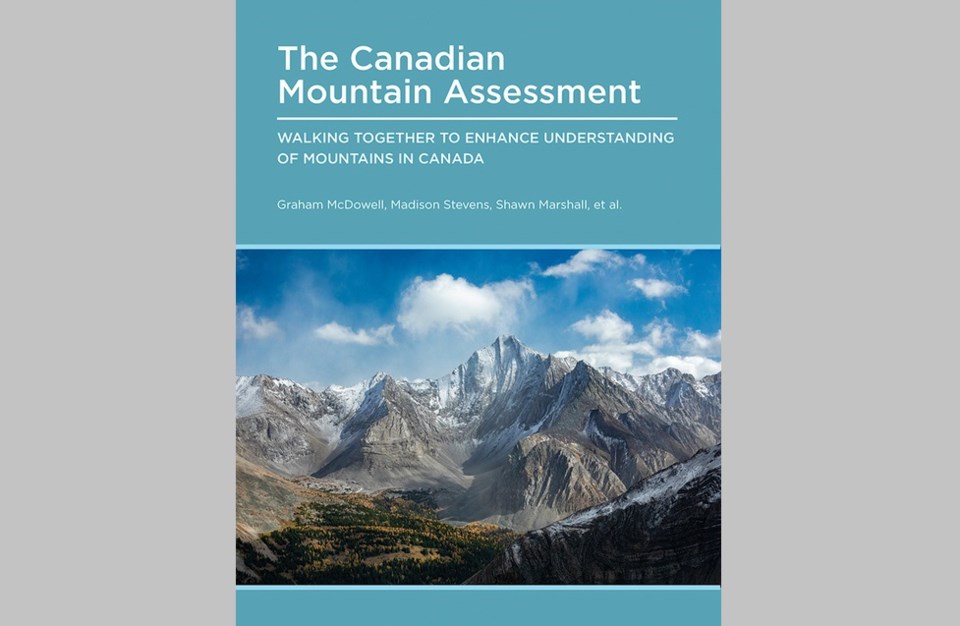They are not just the geographical centers of every tourist’s attention; they are the geological apexes from which major natural and anthropological forces snowball down.
So, where’s the definitive book on our mountains? Where’s the benchmark that demonstrates how important they are and in what ways?
The answer is now here, thanks to Graham McDowell and a collective of cross-cultural collaborators from multiple disciplines. Behold,
This 377-page tome published by the University of Calgary is a colossal effort to break down what is known, what is unknown and what must still be known about Canada’s mountain systems.
As befitting a book that breaks ground on such a big subject, it is simultaneously dense and lofty, complex and utterly magnificent.
“I probably didn’t realize how big of an idea it would end up evolving into,” said McDowell, the book’s project leader. “The mechanics and process of doing it evolved into something completely beyond my initial vision.”
With any big task, many hands make lighter work. His work experience includes the human dimensions of climate change in the cryosphere as well as formal methodologies for knowledge assessment, so he saw the necessity of bringing in many voices.
“It's coming from that background and [I] realized that we just didn't have any real formal understanding of the state of knowledge of mountains in Canada. These major assessment platforms can be really important for raising awareness, for generating interest and support for working on topics like mountains, for example,” he said.
“I saw the need, but thought, why don't we try to do this differently? Why don't we actually not just assess the science – which has been done in all of these other major assessment platforms – but why don't we actually bring Indigenous perspectives into it as well?”
From these humble beginnings came a years-long effort involving contributions from more than 80 Indigenous and non-Indigenous collaborators. His dedication to cultivating relationships with mountain knowledge holders was critical and resulted in the text benefiting from the addition of video recordings of oral knowledge being shared by Indigenous individuals from Canada’s mountain areas.
With major chapter headings such as “Mountains as Homelands” and “Gifts of the Mountains,” it’s easy to see the inclusion of the voices with the greatest historical connection to these areas.
McDowell said that inclusion was as important to the book as its objective of creating a benchmark for mountain knowledge.
“To develop and demonstrate a methodology for knowledge creation in a large-scale assessment context … that is germane not just for mountains, but for any large assessment,” he said.
“There's really recognition (both in Canada and globally) of the importance of multiple ways of knowing, but there are very few examples of how we actually bring those knowledges together in a practical way.”
Jasper’s Brooklyn Rushton contributed by offering insight into regenerative and sustainable tourism for the Gifts of the Mountains chapter, which goes beyond the natural resources and industries that spring from mountains.
“It's a pretty broad topic, but from a tourism lens … mountains give us the ability to fill up and recreate and develop tourism practices,” she said.
“That has the potential to be very extractive. The way that the chapter was formed is that gifts are generally reciprocal. The mountains give you the gift of being able to recreate and develop an economy. We don't actually give back to that environment very well.”
“The Canadian Mountain Assessment” effectively shows the importance of knowledge co-creation, McDowell said.
“We really see so much more to the picture by bringing up different ways of knowing together, and importantly, seeing in starker relief, the sorts of conflicts and tensions that also have emerged in those spaces as economies have transformed, as governance systems have transformed, so having a bit more of a sense of who that has affected and how and with what kinds of implications, I think is quite powerful.”




